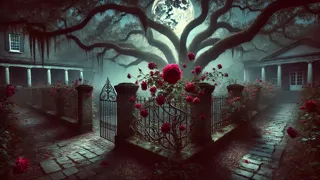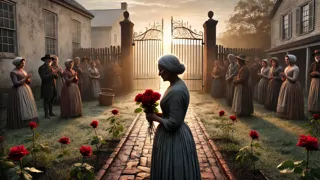Introduction
Summer afternoons in Willow Bend carried a peculiar hush, as if the humid air conspired to hold its breath before a secret outed itself. Ambling down moss-draped lanes, townsfolk would pause at the wrought-iron gate of the Blackwood estate, staring through tangled vines at the faded grandeur of a two-story mansion whose windows were darkened with age. Emily Blackwood, the last of her line, had not been seen in public since the ravages of a hurricane claimed half the town and half her heart. Stories drifted like petals on the breeze: how she rose each dawn to tend to a single rosebush blooming defiantly in cracked stone, how she left her shutters sealed come dusk, and how the house sometimes whispered beneath the weight of unspoken grief. Yet despite visits from neighbors bearing casseroles and floral bows, Emily would offer nothing more than a curt nod, retreating behind curtains embroidered with time. Some blamed her reticence on the loss of a beloved long ago, others on a scandal buried beneath the garden soil. And still, the roses flourished, petals heavy with dew or blood-red stain, defiant tongues daring anyone to unravel the tale they shielded. In that place where light scarce pierced the cracked shutters and memory seeped into peeling wallpaper, Willow Bend awaited the day when Emily’s secrets would finally bloom before skeptical eyes.
Whispers Among the Roses
By the time the sun dipped low behind the pines, the Blackwood garden had taken on an otherworldly glow. Emily’s white-gloved hands hovered over a particular bud whose petals remained unmoved by wind. Town lore insisted that when Emily paused, the entire garden held still—no cricket chirped, no owl hooted, no breeze stirred the tall grass. Mrs. Dalloway, the minister’s wife, once declared she saw Emily whisper a name to the rose before tucking it gently into a leather-bound journal. Each dusk brought furtive glances from curious onlookers, drawn by the scent of wounded earth and something far older. Emblazoned in memory were rumors of a lost fiancé folded between blossoms; another story spoke of siblings disappeared beneath the magnolias. Even the gardener, a soft-spoken man named Clyde, admitted to laying a trembling hand atop the single thriving bush, certain he felt a heartbeat.

Inside the manor, crimson drapes muffled every footstep. Faded tapestries depicted Blackwood ancestors whose eyes seemed to follow intruders. A battered piano sat in the parlor, its keys half silent since the death of Emily’s mother, its melody lingering in fractured memory. On nights when the moon gauged full, splintered light painted ghostly shapes across the drawing room. Visitors swore they heard murmurs within walls—voices pleading, or perhaps lamenting. In the tight-lipped hush of dawn, Clyde would find the front door unlocked and a single rose laid upon the threshold. The family crest engraved on its thorns matched one embroidered in the parlor upholstery.
Yet behind locked doors and iron gates, Emily maintained an unwavering calm. She moved through her ancestral halls like a wraith, brushing dust from statues of her forebears, lighting tapers with steady fingers, and reclining in a high-backed chair next to the rosebush she protected. When questioned by earnest callers—journalists chasing a sensation or genealogists seeking lost records—she gave only a soft smile and a distant gaze. The hush grew heavier after each departure; the garden thrived, and the mansion pulsed like a living thing. As cicadas drowned the night sky, Willow Bend’s people realized that the house had secrets of its own, and Emily alone held the key.
Shadows in the Halls
Rumor spread that footsteps echoed through the empty corridors at midnight. When Reverend Calloway investigated, he found only cold marble floors and dust motes drifting in the lantern light. Upstairs, unlocked doors revealed rooms untouched by time: beds still made, porcelain dolls lined like silent witnesses, and silk curtains knotted with knots no mortal hand had tied. Portraits hung askew, their colors muted, but each bore the unmistakable likeness of an ancestor whose name Emily could recite by heart: Charlotte Blackwood the founding mother, Jonathan Blackwood lost in the Civil War, young Eleanor who vanished without trace. Clyde confessed in broken tones that he had found personal letters tucked within the hearth—letters never sent, addressed simply to “My Dearest Emily.” He dared not read the contents, fearing that knowledge might claim his sanity. Yet each dawn he discovered the letters returned, burnt to ash in the fire grate.

Within the kitchen, the cook whispered of meals prepared for invisible guests. Chairs left empty bore the imprint of shoulders long gone. Glassware clinked softly in cupboards as if toasting some unseen anniversary, while silver tea sets aligned themselves into precise formations. In the billiards room, balls rolled slowly, guided by forces unseen, knocking wood into reluctant homage. The air tasted of rose water and regret, and Clyde, the gardener, swore he heard laughter drifting from behind shuttered windows. No servant dared stay after dusk; the last one fled with hands shaking, leaving behind a threadbare shawl and a silver locket set with a single crimson gem.
Emily herself remained an enigma—part fragile bloom, part vengeful specter. Some evenings she would glide across the parlor floor in a black satin gown, stirring the dust with the train of her skirts. On those nights, she breathed heavy, like someone carrying the weight of a hundred sorrows. Yet in daylight, she sat motionless by her rosebush, a serene figure etched against peeling paint. Visiting women murmured that Emily’s eyes held storms, and that if one stared long enough, they would glimpse someone else—the reflection of a lost sister or a lover taken too soon. With each passing season, the house sank deeper into decay, and the roses grew wilder, their petals dropping like dark confessions on the cracked tile. And so the hush turned to dread as Willow Bend realized that some stories refuse to stay buried.
Secrets Unveiled
When the hurricane returned years later with unexpected fury, the town braced for another round of devastation—but Blackwood manor stood unnervingly intact. Branches snapped like brittle bones against the shuttered windows, and water pooled at the foundation, yet not a single window shattered, nor did a sliver of plaster crumble. In the dawn’s aftermath, townspeople marched to the estate, lanterns in trembling hands, determined to confront Emily and her uncanny rose. The wrought-iron gate sighed open at their approach, revealing a garden drenched in rain yet bursting with blossoms more vibrant than ever before. Overgrown vines curled around stone statues, and beneath each petal lay a thin sheen of water that shimmered like tears.

Inside the parlor, Emily stood before her mirror, brushing rain-slicked hair. The mirror’s surface rippled as though it bore a breeze from another world, and in its depths the townsfolk saw shapes—silhouettes gathering behind her back. A hush descended as Emily spoke, her voice low and steady: "They could not take him from me." At her side, a single rose lay wedged between the petals of a leather-bound diary, its bloom sealed shut. Reverend Calloway reached forward to open the diary and found its pages drenched not in ink but in crimson tears, each word smudged with grief. A name emerged in looping script—Henry—and beneath it, a child’s drawing of two figures beneath a rose tree.
With that revelation, the truth poured out like a river breaking its dam. Emily had sheltered the child of her lost fiancé, a boy she raised in secret halls while the town mourned a tragedy that never truly happened. Late one night, Henry was gone—taken by relatives who feared scandal, leaving Emily alone with her sorrow. She tended the rose in his memory, embedding his first name in each petal that opened each dawn. The mansion itself had absorbed her longing, shielding her beloved child until nature’s fury demanded a reckoning. And as the townsfolk gathered around the single rose, they understood that Emily’s heart had never closed, only fractured under the weight of unspeakable love.
In the days that followed, the garden fell silent. Emily emerged, pale but composed, and walked slowly toward the shocked assembly. In her hands she held a bouquet of roses, each bloom inscribed with a name: Henry, Charlotte, Jonathan, Eleanor—her family, her ghosts, her love given form. She offered them like peace offerings, saying only: "Forgive me for hiding in shadows. But now I want you to remember." The morning light found Willow Bend transformed: broken shutters repaired, windows washed by grateful hands, pathways remapped through open gates. And in the heart of the garden stood Emily, once a recluse, now a broken woman unmasked by sorrow but freed at last by truth.
Conclusion
The sun rose over Willow Bend in a promise of forgiveness long overdue. In the soft dawn, Emily Blackwood wandered the newly tended garden, her footsteps stirring dew from petals that trembled like quiet memories. Gone were the shutters sealed in sorrow; open windows now welcomed birdsong and warm breezes scented by jasmine and rose. Townspeople, once bound by fear and rumor, moved beside her, offering gentle smiles and hands outstretched. They planted new seedlings where thorns had choked the path, and they shared laughter that had not sounded in the manor for decades. Emily paused by the single rosebush she had guarded through storms and secrets, touching each blossom with trembling fingers. In that moment, she felt the weight of grief lift from her shoulders, unfurling like petals catching light. Beneath the clear sky, she read aloud the names etched in each rose until every whispered prayer found a home in the earth. When her voice faltered at the last syllable, the garden answered with a soft rustle, as if every spirit long tethered to her heart offered its benediction. The Blackwood estate, reborn in grace, became a sanctuary of memory and hope—proof that even the darkest secrets can bloom into something beautiful, and that forgiveness, like a rose in spring, can rise again from the ashes of old pain.

















